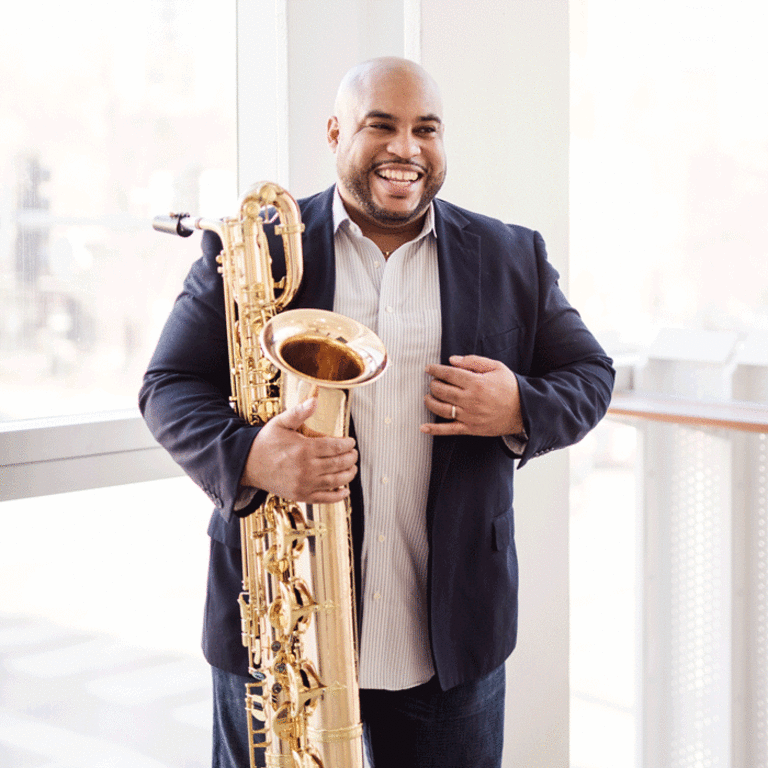Nathanial Ferguson
Nathaniel Ferguson is a master’s student in the Jazz Studies Program who is focused on understanding the processes of music production. Although he initially planned to become a school music teacher, Ferguson was ultimately drawn to the University of Iowa’s graduate program as a performer and educator because of his experiences in the UI’s School of Music.
Ferguson has dedicated his thesis project to producing an album based on his experiences in Iowa City. He plans to premier Iowa Nice in December 2020 as the culmination of his project.
Q: Why did you pursue graduate school / become a researcher?
A: I decided to pursue graduate studies here at Iowa to continue to build on my skills as a jazz performer and educator. Music has been such a pivotal part of my life and I would love to give back as much as possible. Jazz is such a wonderful and uniquely American art form that tells the intricate story of our combined struggles and successes. It is such a raw form of expression and this is perhaps what I love most about it. Anything I can do to propagate its continuous evolution and continue in the preserving of its rich heritage would be incredibly rewarding.
Q: Can you describe your research in non-expert language?
A: My research is centered around music production. More specifically, I am exploring the process of creating music that effectively embodies life experiences. I will be employing many of the various concepts developed throughout my course of study to write, arrange, perform, record, and edit original compositions using the state-of-the-art facilities here at the school of music. My chosen mode or style of expression in this study is jazz, written for a small group (combo) setting.
Q: What impact do you hope to have in your field?
A: I would like to think that my work will help shed some light on how one can go about producing quality art music in a modern setting. Operating primarily as an instrumental technician is a bold transition, but it allows the artist to become more well-rounded. This transition is arduous but rewarding in that artists become capable of writing, performing, and producing music. I believe my work will go a long way towards shedding some light on this process for young, aspiring musicians.
Q: What programs or resources (on or off campus) have influenced or supported your academic goals?
A: The School of Music has been fantastic to me. It is incredibly challenging, but I have found the music faculty to be extremely knowledgeable, personable, and supportive. They have made pursuing my studies and career goals highly achievable – even while I was juggling the challenges of starting a family. The new music facilities are tremendously helpful, as well as the way the overarching Iowa City community embraces the arts. I have never lived in a small, intimate community like this one with such an appreciation for arts and music.
Q: Do you have any role models, mentors, or inspirational people who have encouraged you to pursue your work?
A: The jazz faculty in the School of Music have been fundamental to my success. Dr. Damani Phillips has provided me with incredible real-world mentorship that has already begun to pay dividends. It is incredible how faculty work in tandem with the surrounding music community to get us one-on-one time with accomplished musicians in the field. Since I have been here, I have had an opportunity to meet and/or make music with the likes of Rufus Reid, Al Jarreau, Wycliffe Gordon, Terence Blanchard, Terell Stafford, Donny McCaslin, David King, Carmen Bradford, Andy Narell, Branford Marsalis, Adam Larson and many others! It has been a wonderful experience overall. I have so many wonderful memories and have been enriched by these opportunities.
Q: How has your graduate experience shaped your career goals?
A: I originally came to the University of Iowa to earn public school music teaching credentials. After spending time in the School of Music and the experiences I had with the jazz faculty and department, I decided to pursue graduate studies and learn as much as I could about jazz music and jazz performance. I owe so much of my growth and success to them, and I thus feel confident about the next direction I want to take in my music and teaching career: earning a Doctor of Musical Arts (DMA) and teaching jazz at a major institution.
Q: If you could go back to a time at the beginning of your graduate career, what advice would you give yourself?
A: Be more patient with yourself overall. We live in such an on-demand and fast-paced society, but building strong musicianship does not work that way at all. It can be frustrating going weeks without seeing results, but if you stay consistent and disciplined with your practice, you will improve.
